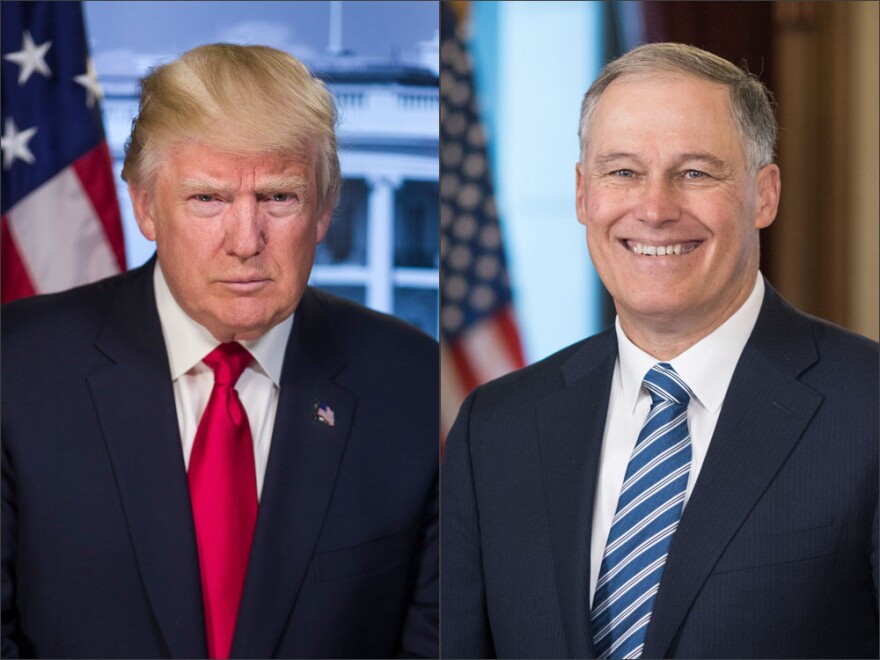When President Donald Trump signed an executive order on immigration and refugees last month, it was Washington state that led the legal battle to overturn it. Now, after a string of court rulings, it appears that the fight could be be heading all the way to the U.S. Supreme Court.
And the question many people are asking is, why Washington?
There’s no single answer, but a look back at some recent and not so recent history, provides some insight.
The recent history started on November 20, 2015, shortly after the Paris terror attacks. There was a rally on the steps of the Washington state Capitol to oppose allowing Syrian refugees into the United States. Pro-refugee demonstrators also showed up and disrupted the rally.
The dueling events made the local news. But the following day something else happened that put Washington state on the national map in the debate over Syrian refugees.
Washington in the spotlight
The New York Times published an opinion piece by Washington Gov. Jay Inslee, a Democrat, headlined: “Why My State Won’t Close Its Doors to Syrian Refugees.” In that piece he noted that in 1975 then-Republican Gov. Dan Evans had welcomed Vietnamese refugees to Washington “even as other states turned their backs.”
The chair of the Washington State Republican Party wrote an open letter to Inslee saying there was a “big difference.” And Evans himself pushed back in an interview with KUOW.
“It’s very difficult to compare history with today’s circumstances and I think they are quite different,” Evans said.
Nonetheless, Inslee had positioned Washington as a beacon at a time when many governors were saying “no” to refugees from Syria. When Trump campaigned in Washington in 2016 he decried what he called the “large influx” of Syrian refugees in the Northwest and repeatedly wished the crowd “lots of luck.”
Now, nine months later, Washington is the lead plaintiff in a lawsuit that challenges President Trump’s order to suspend the country’s refugee program and block travel from seven mostly Muslim countries.
Suddenly, Washington state finds itself in the national -- and even international -- spotlight. As do Inslee and the state’s Democratic Attorney General Bob Ferguson.
Ferguson has called Trump’s executive order unconstitutional. Inslee has called it cruel and unjustifiable. And once again he’s looked to history for comparison.
“Seventy-five years ago we saw this movie again,” Inslee said.
‘Americans need to stand up against this'
Inslee was referring to February 19, 1942 when President Franklin Delano Roosevelt issued executive order 9066 authorizing the relocation of Japanese Americans from the west coast.
Inslee noted he’s from Bainbridge Island where armed soldiers put more than 200 people of Japanese ancestry on a ferry to Seattle for eventual removal to internment camps.
“I know from Bainbridge Island what fear can do and I know that Americans need to stand up against this today across America,” Inslee said.
FDR issued that order 75 years ago this week. But unlike today, then-Washington Gov. Arthur B. Langlie did not resist the president’s order.
A look inside a locked vault at the Washington State Archives reveals what Langlie did do.
Archivist Benjamin Helle dug up a press release from Langlie’s office dated two days after FDR’s order. It said that Langlie had ordered “all Japanese” in Washington to surrender to the State Patrol “all firearms, ammunition, explosives or other materials or instruments which might be used to injure property or life.”
The governor ordered Washington residents of Japanese descent to give up their guns and knives by the following Thursday, February 26.
Eyes on 2020?
Washington State Republican Party Chair Susan Hutchison said she’s hearing support for Trump’s executive order. She also has a theory for why Inslee and Ferguson are doing legal and rhetorical battle with Trump.
“I have sources that say Jay Inslee believes he could run for president,” Hutchison said.
At a recent news conference Hutchison said, “He’s been more colorfully vocal in the last few weeks than I’ve seen him in the last four years.”
She also suggested Ferguson was in essence launching his bid for governor in 2020.


